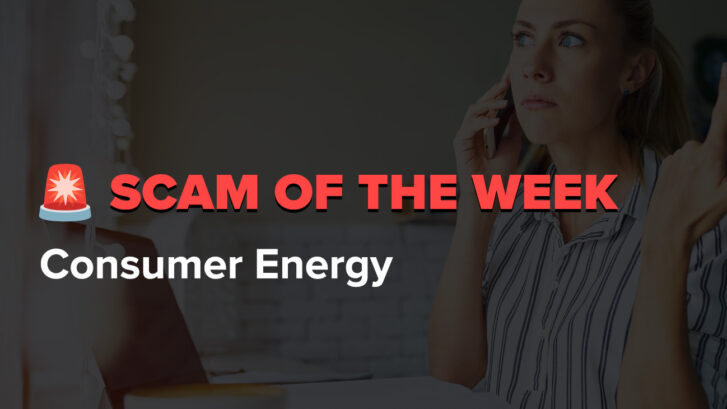In the ever-evolving world of scams and swindles, there’s a sly artistry to the deceptions that cunning fraudsters employ. This week, we unveil the spotlight on the and expose the latest and greatest in telephone trickery. It’s time to unravel a cunning charade that masquerades as an emissary from the Consumers Energy Credit Department. It’s a tale of audacious deception where people are tricked into giving away sensitive information. So, let’s dive into this week’s scam – the Consumer Energy Scam call!
In this article, we cover:
- The details of the Consumer Energy Scam call
- Why the Consumer Energy Scam call is dangerous
- How to protect yourself from the Consumer Energy Scam call
The details of the Consumer Energy Scam call
The Consumer Energy Scam call is a deceptive telemarketing ploy that impersonates the Consumers Energy Credit Department. In this fraudulent call, individuals are instructed to contact a toll-free number, 866-565-6001, and provide their 12-digit account number for what is claimed to be essential information about their utility account. This call is a classic example of phishing, with the intent of extracting sensitive personal information from unsuspecting victims. It was initially detected on March 22, 2018, and has been most frequently reported in Michigan, Florida, Kentucky, Ohio, and Georgia. The most commonly used numbers associated with this scam include (866) 565-6017, (866) 565-6001, (866) 565-6024, (866) 897-0028, and (866) 599-5998. It is essential for consumers to be vigilant and avoid sharing any personal information with such suspicious calls to protect themselves from potential identity theft and fraud.
Actual audio of the Energy Fraud Scam Call Exploiting the Consumers Energy Brand
“Hello. This call is on behalf of Consumers Energy Credit Department with important information regarding your utility account. Please call us today toll free at 866-565-6001. Please have your 12 digit account number ready when calling. That number is 100024080796.”
Why the Consumer Energy Scam call is dangerous
The Consumer Energy Scam call poses a significant threat to individuals who fall victim to its deceptive tactics. Here’s why it’s crucial to be cautious:
- Identity Theft Risk: The scam aims to extract sensitive personal information, such as your 12-digit account number, under the guise of providing essential utility account information. This information can be used for identity theft, leading to financial fraud, fraudulent accounts, and other malicious activities.
- Financial Loss: Victims may unknowingly share their account details, making them vulnerable to unauthorized transactions and financial losses. Scammers can use this information to exploit victims’ financial accounts.
- Privacy Invasion: Falling for this scam can compromise your privacy. Sharing personal data with fraudsters can lead to a breach of your confidential information, causing stress, inconvenience, and potentially long-lasting consequences.
- Reputation Damage: Consumers who fall victim to this scam may face harm to their reputation and financial well-being. Rebuilding trust and rectifying the damage can be a time-consuming and emotionally taxing process.
It’s essential to remain vigilant and recognize the dangers associated with the Consumer Energy Scam call. Being aware of these risks can help you protect yourself and your personal information from falling into the wrong hands.
How to protect yourself from the Google Business Listing Scam
Protecting yourself from the Consumer Energy Scam call and similar fraudulent attempts is crucial. Here are some steps you can take to safeguard your information and privacy:
- Verify Caller Identity: Always be cautious when receiving unsolicited calls. If you doubt the caller’s legitimacy, ask for their name, contact information, and the purpose of the call. Do not provide personal information unless you’re certain of their authenticity.
- Contact the Utility Company Directly: If you receive a suspicious call related to your utility account, hang up and independently verify the legitimacy of the call. Contact the utility company using official contact information available on their website or bills.
- Use a Call Screening Service: Consider using call screening and call blocking services like YouMail to filter out potential scam calls. These services can help identify and block fraudulent calls.
- Educate Yourself: Stay informed about common phone scams and fraudulent tactics. Awareness is your best defense against falling victim to these schemes.
- Report Suspicious Calls: If you receive a call you believe to be a scam, report it to the relevant authorities, such as the Federal Trade Commission (FTC) or your state’s attorney general’s office.
By taking these precautions, you can minimize the risk of falling prey to scams like the Consumer Energy Scam call and protect your personal information and financial well-being.
To stay ahead of the scammers and enhance your call protection, consider downloading YouMail, a reliable call screening and call blocking app. YouMail is here to help you safeguard your communication and maintain your peace of mind.
To protect yourself from the Consumer Energy Scam call, download YouMail today.
Find about more Robocall Scams at the YouMail Robocall Scam Guide.





